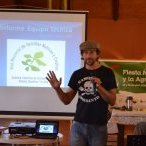English · Español

9 de septiembre de 2015 | Entrevistas | 6ta Fiesta de la Semilla Criolla y la Agricultura Familiar - Uruguay | Bosques y biodiversidad | Soberanía Alimentaria
Appreciating native seeds to contribute with the quality of lives: Interview with agronomist Mariano Beltrán
Descargar: MP3 (3.4 MB)
Agronomist and agroecology expert, Mariano Beltran, is one of the coordinators of the technical team of the Native Seeds Network, member of the National Agroecology Plan that seeks to expand the number of farmers and consumers under agroecologically-based food production, distribution and consumption systems to generate benefits that contribute with the quality of life of rural and urban inhabitants in Uruguay.
Real World Radio interviewed Beltran, who is also a Professor at the Family Farming Course given by UTU University and advisor of organic grain cooperative Graneco.
Beltrán said that the goal of the Network is to promote the saving and appreciation of genetic values of Uruguay, i.e. all plants grown that make up the genetic, agricultural and cultural heritage of our country. “Around the world there are grave concerns over the loss of biodiversity and the loss of agrodiversity, which is the part of diversity that humans use with food purposes. Through the Green Revolution model, which promotes hybrid seeds and the use of technological packages where seeds are mere inputs controlled by seed companies, this development model has led to people no longer using native seeds. This implies the loss of thousand years of heritage, of accumulated work, and this not only causes societies to become more dependent on corporations and technology packages, but to lose the capacity to adapt to climate change, for instance, sovereignty is lost (because corporate seeds are patented), it is an economic, environmental and food insecurity issue.
The Seed Network aims to expose this problem and go against the Green Revolution discourse that promotes the replacement of these seeds for others that will produce more and faster”.
During the interview, Beltran said that the National Native Seed Network was created in 2003, at the initiative of three organizations: the Association of Organic Farmers of Uruguay (APODU) and also REDES-Friends of the Earth Uruguay and the Agronomy School. The Network is part of Future Earth, an organization that supports environmental projects such as the Seed Network from Sweden.
The network is organized through local farmer groups. There are 27 groups throughout the country, each with their own meeting agendas, working on rural schools, some of them are suburban or rural farmers. A National Festival is organized every two years, which works as an open assembly.
“The Network is made up of many people, it gives lectures, capacity building sessions on different issues related to seeds. As in the Governmental Program there was a space to contribute with a National Agroecology Plan, we saw the opportunity to give content to this, so together with the Uruguayan Agroecology Network we elaborated a Plan to submit to the Agricultural Comission and MPs, to other spaces with political impact and the University of the Republic”, said Beltrán.
And he added “agroecology has always been linked to social, indigenous peasant movements, against the problems of the “Green Revolution”, which was not only applied to industrial food production, but many Latin American and European governments used it in their rural extension programs. This led to the traditional way of producing food being replaced by this model, and researchers started to wonder how to solve pest issues, the erosion of soils, and saw that traditional systems solved them with environmental management techniques”.
About the 6th National Native Seed Festival that took place this year, Beltran said that this is a space for national and regional meetings, where farmers can bring their seeds and exchange them. “We aim at promoting seeds in more hands to avoid losing them. Exchanges are essential”, he concluded.








